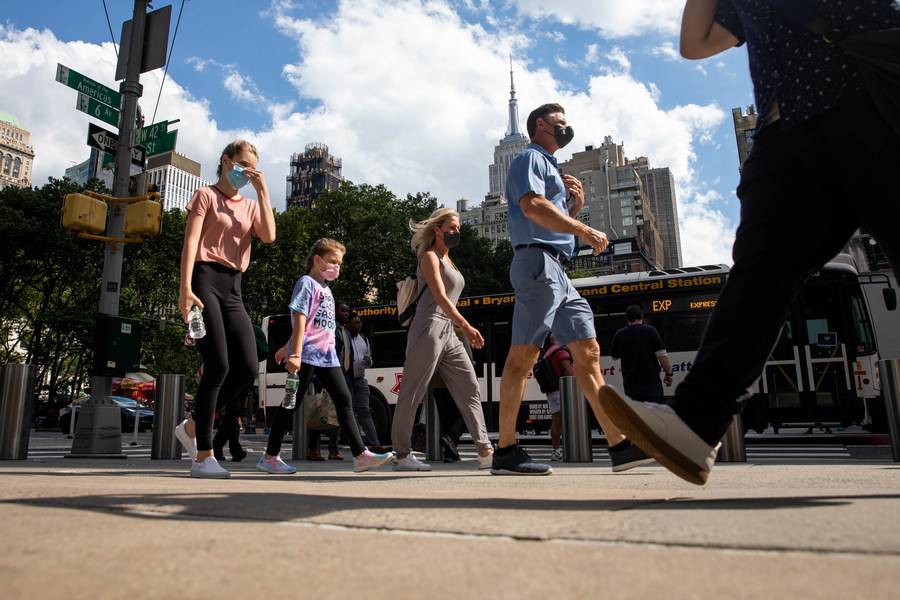Experts warn less vaccinated areas more at risk for highly contagious Delta variant

Two women enjoy their leisure time outside a bar in San Francisco, California, the United States, June 15, 2021. (Xinhua/Wu Xiaoling)
The Delta variant, which is believed to be more transmissible and cause more severe disease, could cause an upsurge in infections, but the levels will vary depending on the rates of vaccination in each area, said former FDA Commissioner Scott Gottlieb.
WASHINGTON, June 21 (Xinhua) -- While the White House claimed milestone of administering over 300 million COVID-19 vaccine shots in the first 150 days since U.S. President Joe Biden took office, the highly contagious Delta variant continues threatening the country, especially in states with the lowest vaccination numbers.
About 45.1 percent of the U.S. population is fully vaccinated against COVID-19, and 53.3 percent of the population has received at least one shot as of Sunday, according to latest data of the U.S. Centers for Disease Control and Prevention (CDC).
But some states -- such as Alabama, Arkansas, Louisiana, Mississippi, Tennessee and Wyoming -- have fully vaccinated less than 35 percent of residents.
The Delta variant, which is believed to be more transmissible and cause more severe disease, could cause an upsurge in infections, but the levels will vary depending on the rates of vaccination in each area, said Scott Gottlieb, former commissioner of the U.S. Food and Drug Administration.

People walk along the Street in New York, the United States, June 15, 2021. (Xinhua/Michael Nagle)
Models for Delta's spread show the fall could see a peak of around 20 percent of the infections the United States recorded in January, but the distribution of those predicted surges is not even across all areas, Gottlieb said in an interview with CBS on Sunday.
"Connecticut, for example where I am, shows no upsurge of infection, but Mississippi, Alabama, Arkansas, Missouri, show very substantial upsurges of infection. That's based entirely on how much population wide immunity you have based on vaccination," he said.
The Delta variant, which was initially identified in India in December 2020 and first detected in the United States in March 2021, has already been detected in over 40 U.S. states, according to the CDC.
CDC Director Rochelle Walensky warned this variant is expected to become the dominant strain in the Untied States, adding it is more transmissible than others.
"As worrisome as this Delta strain is with regard to its hyper transmissibility, our vaccines work," Walensky said.
New research suggests less vaccinated areas are at risk. Scientists at Helix analyzed nearly 20,000 COVID-19 tests collected since April and found the Delta variant is quickly rising in counties with fewer vaccinated residents, according to a CNN report.

Rochelle Walensky, director of the U.S. Centers for Disease Control and Prevention (CDC), testifies during a Senate Appropriations subcommittee hearing on Review of the FY 2022 Budget Blueprint for the Centers for Disease Control and Prevention in Washington, D.C., the United States, on May 19, 2021. (Jim Lo Scalzo/Pool via Xinhua)
Experts have stressed vaccines are the key to containing the variants and reopening the country safely.
So far, studies suggest that the current authorized vaccines work on the circulating variants, said the CDC.
Research are still underway on how long protection from the COVID-19 vaccines will last, and when a booster is required, Zhang Zuofeng, professor of epidemiology and associate dean for research with the School of Public Health at the University of California, Los Angeles, told Xinhua.
He urged more people to get vaccinated as soon as possible to keep the variants from taking hold. Zhang also stressed the importance of keeping social distance, wearing masks and personal hygiene as vaccines could not offer 100 percent protection.
Photos
Related Stories
- Chinese mainland reports 1 new locally transmitted COVID-19 cases
- Silk Road archaeological discoveries remarkable despite pandemic: report
- Vietnam receives China's Sinopharm COVID-19 vaccines
- China's Sinopharm COVID-19 vaccines arrive in Thailand
- China's assistance enables Ethiopia to keep fighting COVID-19: official
Copyright © 2021 People's Daily Online. All Rights Reserved.










